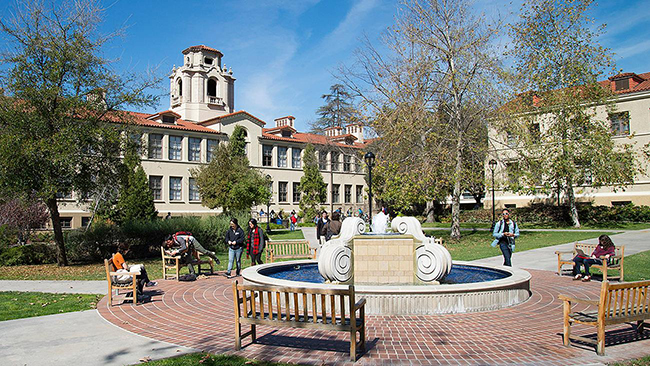Speakers heat up at water forum
What is arguably the liveliest water forum yet, members of Active Claremont and the community gathered last week in an attempt to hammer out the details of Measure?W. Although many in attendance were successful at letting off some steam, finding common ground was futile.
With the vote on Measure W fast approaching, Claremont voters continue to seek clarification on the ballot measure that would allow the city of Claremont to borrow up to $135 million in revenue bonds to finance the acquisition of the water system currently owned and oper
On October 16, over 100 of those voters, as well as most of the Claremont City Council, gathered at the Hughes Community Center for a two-hour forum presented by Active Claremont. Both sides of the bond measure debated the issue, with representatives from each side given 20 minutes to present their position followed by the opportunity to field questions from the audience.
Those in favor of the ballot measure believe the purchase would lower water bills, allowing the city to set its own water rates and look towards future provisions for water reclamation.
Those against the measure argue the city’s feasibility study is flawed, and that ratepayers will be taking on an enormous debt without knowing how the system will be run.
Freeman Allen, member of Claremont Friends of Locally Owned Water (FLOW) and proponent for Yes on W, was first to speak, reminding residents of the city’s accredited $55 million appraisal of the water system. The $135 million revenue bond does not reflect what the city expects to pay to acquire it, he insisted
“I’d like to point out that in Arizona, which has a publicly-elected public utilities commission, Golden State Water owned a water system that was somewhat larger than ours in Claremont. Golden State Water sold that system in 2011 for $34 million,” said Mr. Allen.
“Golden State Water is extremely keen on having that number $135 million in there, because I think they want it to appear that’s what the city intends to spend. But it’s not what the city intends to spend,” said Mr. Allen. “It’s a credit limit. So, to me, this is just disgusting. It’s an outright lie. Anybody who wants to look at the factors can easily determine that is not a true statement.”
Golden State Water Company recently released its draft analysis of the city’s water system, estimating the value to be $222,772,010. Using the Replacement Cost New Less Depreciation (RCNLD) methodology for valuation, engineers at Hatch Mott MacDonald arrived at this figure by calculating what it would cost to replace the entire existing water system.
Mr. Allen referred to this draft analysis during his presentation and, while he acknowledged that the RCNLD methodology is a legitimate form of appraisal, says it wouldn’t hold water during an eminent-domain proceeding where the courts would determine its value.
“There was a court case that had two prices, one based on impound and one based on replacement value. The appeals court ruled when the construction costs substantially exceeds a figure that earnings will support, it should be given little weight in determining the market value,” he explained. “If you’re going to use this preliminary figure, and if this goes to eminent domain, the court should pay little attention to that larger number.”
In Claremont, water rates from 2009 through 2013 escalated substantially as Golden State made repeated rate hike requests, which were routinely approved by the California Public Utilities Commission. According to Mr. Allen, owning the water system would have many benefits, including the city’s ability to set its own rates.
“When the bond is paid off, the rates will go down precipitously and, depending on the purchase price, they could go down early on,” he said. “We will have lower rates.”
Following Mr. Allen, STOP the Water Tax—No on W advocate Mark Sterba took his place before the audience and presented his case for a No vote on November 4.
Mr. Sterba was a last minute fill-in at the forum after CAWA member Donna Lowe, who said she hadn’t had time to prepare for the 20-minute introductory speech format, cancelled as the group’s scheduled speaker. Ms. Lowe was present at the meeting, but did not respond to questions from the audience.
Addressing the packed forum, Mr. Sterba asserted his position that the city’s feasibility study is flawed because it assumes there will be an ongoing increase in water consumption. Further, Mr. Sterba believes the city should study the costs of purchasing the system if water consumption is reduced by 20 percent rather than just a model where overhead costs of running the system are reduced.
“I am not a fan of Golden State Water,” admitted Mr. Sterba. “I don’t work for them and I am not a fan of them. But for me, this is not about emotion. It’s about business.”
According to a report prepared by Mr. Sterba, if the bond measure does pass, it would mean an additional $1,215 a year in fees for residents for the next 30 years. “That’s an additional $101.23 per month, per ratepayer,”? he said. “It’s not an increase in your water bill, it’s how much you’re going to have to pay to cover the bond. And what do we get for that? We get the exact same infrastructure we have today. Nothing changes. “
For Mr. Sterba and the Stop?the Water Tax group, there are still too many unknowns.
“We get the same suppliers we have today, which is Three Valley and Upland,”?he said. “We have an unknown system operator. We have an unknown rate structure. We have potentially reduced system investment. We have a chance to talk to local government, who aren’t running the system, about rates.”
Mr. Allen disagreed that the average cost of water will increase because the estimate is based on comparing Claremont’s system to the city of Los Angeles, rather than a neighboring city of equal size and population.
“In order for rates to go up to $101.23, you’d have to sell the system for $200 million,” said Mr. Allen. “If we had a system like La Verne and based the bonds on $135 million instead of $200 million, then the cost of the bonds would be something like $67 per month. But if you subtract from the $64 savings with rates like La Verne, even if we were to pay $135 million for the system, it would only raise rates by a small amount.”
So why, exactly, is Mr. Sterba against Measure W?
“It conflicts with conservation goals and laws, the price is too high and the feasibility study is flawed,” he told the audience. “I’m not against Claremont owning the water system, but we’re in the middle of a drought. My preference would be to conserve water, get our usage under control and then work on looking back to buy the water company.”
According to Mr. Sterba, the source of Claremont’s water has already begun to shift.
“There’s some stats out there that claim Claremont imports only one-third of the city’s water,” he said. “I talked with the Water Master for the region and we’re getting one-third of our water from Three Valleys, but we’re now getting water from Upland at a cheaper price.”
Brian Bowcock, a La Verne resident and Division III director with Three Valleys Municipal Water District challenged that statement.
“What water is it we get from Upland?” Mr. Bowcock questioned.
“We are importing 17 percent of water last year from Upland,” replied Mr. Sterba.
Growing increasingly agitated, Mr. Bowcock again challenged the claim.
“I don’t know what Water Master you’re talking to, because I sit there as one of the directors and we don’t get any water from Upland,” Mr. Bowcock said. “None. Zero.”
Claremont has been and will continue to get all of its water from the Colorado River with not much of a price difference until further notice. However, according to Mr. Allen, if the city owned the water system, there would be provisions that would allow an increase in water capture with thoughts of water reclamation in the future.
“We’d have a lot more freedom and capacity to reclaim water,” explained Mr. Allen. “As times get worse here with our water supply, we’re almost certainly going to have to go to water reclamation. Now Golden State Water in its Urban Management Plan so far hasn’t said a word about water reclamation.”
Mr. Allen illustrated that the Claremont Colleges have a proposed water reclamation project for their own system, but the Colleges are unable to pursue it.
“There’s not enough sewage generated at the Colleges to run the plant at full capacity,”?Mr. Allen said. “Golden State says you can’t use the sewage outside of the Colleges because that would then be used for replacing water some of their clients might use or they might reclaim it for themselves.”
Walking through the audience with microphone in hand, the mediator offered residents an opportunity to pose questions to each of the speakers.
“The state of California is poised to take over the usage of groundwater,” asked one woman. “How will that affect the no and the yes vote on Measure W?”
With Mr. Allen and Mr. Sterba unable to address the question sufficiently, Mayor Joe Lyons offered an answer.
“Because we are in an adjudicated basin, there will be no impacts of the governor’s ruling about adjudication of groundwater,” he said. “That should allay the fear that there will be any state regulation.”
As the audience began to get restless, the mediator continued to take questions from around the room.
“Does it bother you to see who’s paying for your newspaper ads, your mailings and your position for Measure W?” asked longtime resident Randy Scott asked both speakers.
“Claremont FLOW would appreciate any donations, $10 would be significant,” said Mr. Allen with a smile. “We have a total budget of about $25,000. We’re at somewhat of a disadvantage. I understand Golden State Water has spent already $300,000, and people are receiving mailers with these extravagant figures that are absolutely baseless. I’m just furious about the lies that are going out to people who are not really in a position to consider the facts.”
Mr. Sterba responded.
“I’m going to take offense that I’ve provided a mathematical equation and been told that it’s not based on facts,” he said. “Mr. Scott, I really wish the No side was larger. It’s really a group of about eight people that was trying to get out there and work with Golden State.”
Someone shouted from the crowd to Mr. Sterba, “Where’s the money coming from?”
“It’s on the flyer, the money is coming from Golden State,” Mr. Sterba said. “Golden State should be able to defend their position if someone is trying to take over their company. I’m not getting paid. I did my own analysis. I ran my own numbers. They have been verified.”
Mr. Sterba went on to explain the challenges faced by the No on W camp.
“We have eight people,” he adds. “You have an entire city council and almost everyone else in the city, so it is an uphill battle.”
Video of the Active Claremont Water Forum is available online in their video library. For more information, visit www.activeclaremont.org.
—Angela Bailey
news@claremont-courier.com










0 Comments